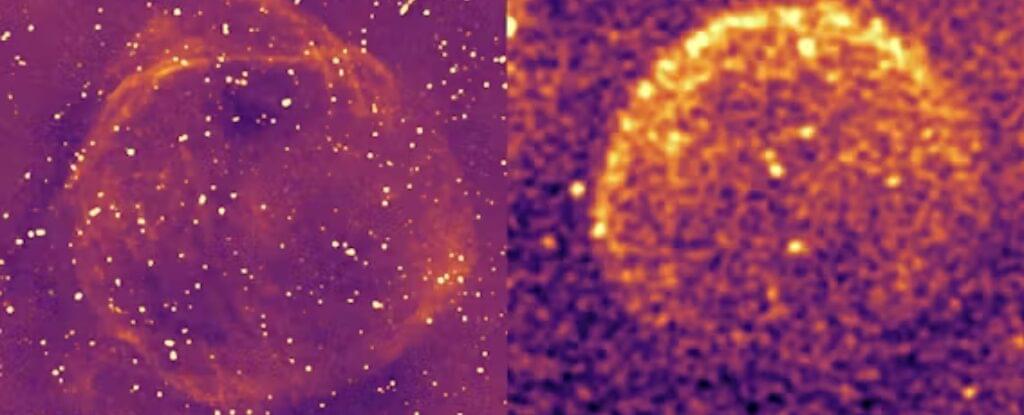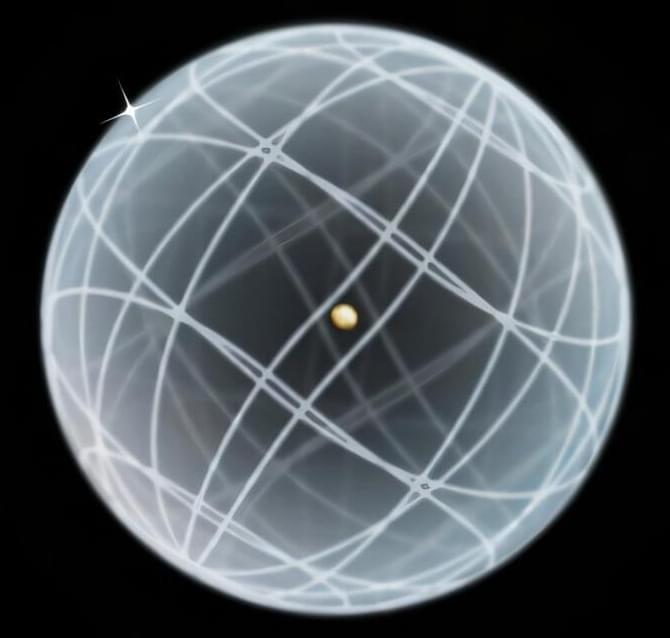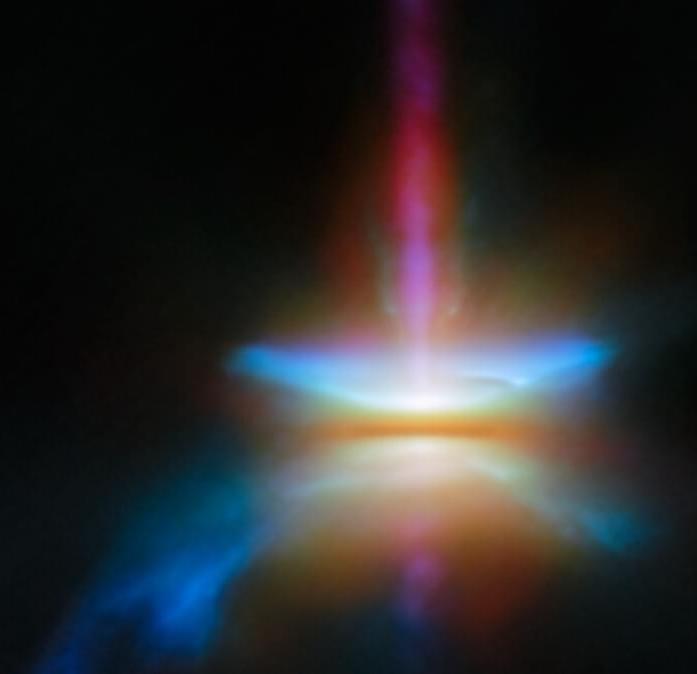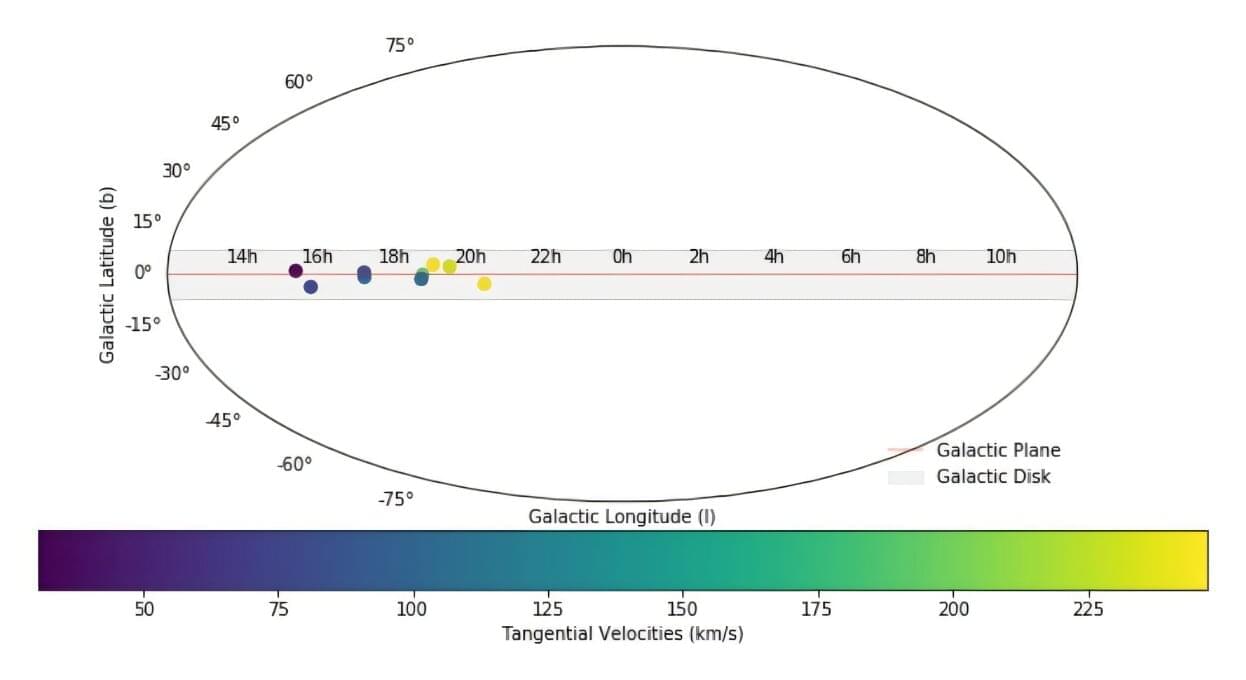Category: space – Page 131
Spectacular photo taken from ISS shows ‘gigantic jet’ of upward-shooting lightning towering 50 miles over New Orleans
A newly unveiled photo captured by an astronaut on the International Space Station (ISS) provides a rare glimpse at an upward-shooting “gigantic jet” of lightning likely extending more than 50 miles (80 kilometers) above the U.S. coast.
The striking image was taken by an unnamed ISS crewmember on Nov. 19, 2024, but it was not initially shared by NASA or any other space organization. However, photographer Frankie Lucena, who specializes in capturing giant lightning sprites, stumbled across photos of the event on the Gateway to Astronaut photography of Earth website and shared them with Spaceweather.com, which reshared the shots Feb. 26.

Radio Telescopes Are Revealing a Trove of Faint Circular Objects in The Sky
New radio telescopes like ASKAP and MeerKAT are unveiling a ‘low surface brightness Universe’, enhancing our understanding of its hidden features.
Radio astronomers see what the naked eye can’t. As we study the sky with telescopes that record radio signals rather than light, we end up seeing a lot of circles.
The newest generation of radio telescopes – including the Australian Square Kilometre Array Pathfinder (ASKAP) and MeerKAT, a telescope in South Africa – is revealing incredibly faint cosmic objects, never before seen.
In astronomy, surface brightness is a measure that tells us how easily visible an object is. The extraordinary sensitivity of MeerKAT and ASKAP is now revealing a new “low surface brightness universe” to radio astronomers.
What’s Your Brain’s Role in Creating Space & Time?
PBS Member Stations rely on viewers like you. To support your local station, go to: http://to.pbs.org/DonateSPACE
Sign Up on Patreon to get access to the Space Time Discord!
/ pbsspacetime.
Physics is the business of figuring out the structure of the world. So are our brains. But sometimes physics comes to conclusions that are in direct conflict with concepts fundamental to our minds, such as the realness of space and time. How do we tell who’s correct? Are time and space objective realities or human-invented concepts?
Episode Companion Playlist.
• What If Space And Time Are NOT Real?…
Check out the Space Time Merch Store.
https://www.pbsspacetime.com/shop.

Astronomers detect new polar cataclysmic variable
Using the ROentgen SATellite (ROSAT), astronomers have discovered a new cataclysmic variable system of the polar subtype. The new polar, which received the designation ZTF J0112+5827, has an orbital period of approximately 81 minutes. The finding is detailed in a research paper published on the arXiv preprint server.
Cataclysmic variables (CVs) are binary star systems composed of a white dwarf and a normal star companion. They irregularly increase in brightness by a large factor, then drop back down to a quiescent state. Polars are a subclass of cataclysmic variables distinguished from other CVs by the presence of a very strong magnetic field in their white dwarfs.
Now, a team of astronomers led by Jiamao Lin of the Sun Yat-sen University in Zhuhai, China, reports the discovery of a new CV of the polar subclass. By examining the X-ray and cyclotron radiation characteristics of a CV candidate ZTF J0112+5827, they confirmed its polar nature.

Collaborative analysis improves theoretical understanding of hyperfine splitting in hydrogen
Two experiment collaborations, the g2p and EG4 collaborations, combined their complementary data on the proton’s inner structure to improve calculations of a phenomenon in atomic physics known as the hyperfine splitting of hydrogen. An atom of hydrogen is made up of an electron orbiting a proton.
The overall energy level of hydrogen depends on the spin orientation of the proton and electron. If one is up and one is down, the atom will be in its lowest energy state. But if the spins of these particles are the same, the energy level of the atom will increase by a small, or hyperfine, amount. These spin-born differences in the energy level of an atom are known as hyperfine splitting.
While it’s commonplace for many scientists to collaborate on nuclear physics experiments at the U.S. Department of Energy’s Thomas Jefferson National Accelerator Facility, it’s rarer for the lab’s individual experiments to collaborate with each other. But that’s exactly what g2p in Jefferson Lab’s Experimental Hall A and EG4 in Experimental Hall B did.


NASA telescope takes mind-blowing photo of the exact moment a star is born
The picture was taken by the James Webb Space Telescope and shows a star being born in the protoplanetary system Herbig-Haro 30.
Now due to the vastness of space, we aren’t *actually* looking at the exact moment the star was born, but rather, how this cosmic creation would have looked like when it happened thousands, if not millions of years ago.
It’s basically a whole lot of timey-wimey stuff over deep space.
We Are the Target: Defending the Cognitive Terrain with Dr. Tamara Schwartz | CSI#27
Description: We are the targets for numerous information campaigns, as companies, politicians, cybercriminals, and nation states guzzle up the digital dust of our online selves. These information campaigns are designed to trigger our survival instincts in order to prevent us from thinking, and instead trigger an emotional reaction. Dr. Schwartz will discuss this rivalry for power, and how we must first learn how to calm our survival brain in order to defend our cognitive terrain against the onslaught of information warfare.
Speaker Bio: Dr. Tamara Schwartz, USAF (ret.), is an Associate Professor of Cybersecurity and Strategy at the York College of Pennsylvania, and an affiliate researcher with Cybersecurity at MIT-Sloan Interdisciplinary Consortium for Improving Critical Infrastructure Cybersecurity, an international cybersecurity think tank. While on active duty, Dr. Schwartz’s thought leadership informed the standup of Cyber Command and the design of various command centers supporting Joint Space, Cyber, and Global Strategic Operations, and her work at the U.S. Embassy in Amman, Jordan earned her the 2011 Information Operations Officer of the Year. More recently, Dr. Schwartz was a member of the 2020 “Dr. Evil task force,” with the Defense Threat Reduction Agency, identifying future threats to inform DoD investments in emerging technology. She received her B.S. in Industrial Engineering from Rensselaer Polytechnic Institute, her M.S. in Engineering Management from the University of Dayton, and her Doctorate of Business Administration from the Fox School of Business, Temple University. Her research expertise includes Artificial Intelligence, cybersecurity as a strategic competitive advantage, and information warfare.
Information Warfare, by Dr. Tamara Schwartz.
https://he.kendallhunt.com/product/in… College of Pennsylvania, Cybersecurity Management https://www.ycp.edu/academics/program… Weapons of Mass Disruption https://podcasts.apple.com/us/podcast…

Nine open clusters discovered by astronomers
Astronomers have performed a multiwavelength study of nine open cluster candidates. As a result, they found that all of them are genuine open clusters and characterized by their fundamental properties. The finding was reported in a research paper published Feb. 21 on the arXiv pre-print server.
Open clusters (OCs), formed from the same giant molecular cloud, are groups of stars loosely gravitationally bound to each other. So far, more than 1,000 of them have been discovered in the Milky Way, and scientists are still looking for more, hoping to find a variety of these stellar groupings.
Expanding the list of known galactic open clusters and studying them in detail could be crucial for improving our understanding of the formation and evolution of our galaxy.